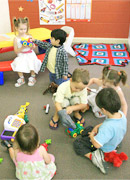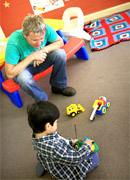Know when to help
Did you know?
If you place unrealistic expectations on the child they can become frustrated, and begin to doubt their abilities.
Before you can help a child learn new skills, you need to observe the child so you can decide when it is appropriate to offer help.
There are a number of factors that may affect your decision including the child's age, stage of development and events that are going on in their life. You should make sure you are in tune with these.
Staying tuned in

You need to be sensitive to the varying levels of competence of the children and know when to offer choice, and when to offer help. This involves 'staying tuned in' to what is going on around you, as well as being aware of the developmental stages of children both as individuals as well as a group.
If you are not aware of the varying levels of competence, unrealistic expectations may be placed on the child. This can lead to the child becoming frustrated, developing low self esteem and beginning to doubt their abilities. Being aware and sensitive to each child's individual needs will allow you to recognise when assistance is required. This awareness and understanding of the stages of development will enable you to offer age/stage appropriate activities. When children are able to achieve set tasks it gives them a sense of self-satisfaction, independence and confidence.
Have a look at the list of ages and self-help skills provided below.
Think of 2 more self-help skills for each of the following age groups. Record your ideas in your notebook.
0 - 12 months
1 - 2 years
2 - 3 years
3 - 4 years
4 - 5 years
5 - 6 years.
Events that can impact on a child's routine

You also need to have your radar tuned to any events that may be affecting a child's capacity to engage in the program you have planned. Any number of events may impact on a child's routine, causing them to withdraw into themselves. You need to be sensitive to this.
Below is a list of some of the events that may impact on a child's routine.
- sickness of a family member or friend
- family issues or changes in the home environment
- excursions, visitors or special events
- a change in drop-off and pick-up arrangements or routines
- a change of staff at the centre
- the introduction of a new baby at home
- moving house or changing living arrangements
- the separation of parents or members of the family unit
- a death in the family.
How do you know what level a child is at? How can you establish what knowledge or skill is required? Listed below are some factors that you may need to consider when planning for children's self-help skills.
- the child's age/stage of development
- cultural background
- the group dynamics
- the centre's staff/child ratio
- the child's level of independence
- the child's temperament
- what level language skills the child has
- what types of activity are provided (make sure expectations are not too high).
Choose 2 of the factors listed above. In your notebook, explain how each of these 2 factors impact on the development of a child’s self-help skills.




